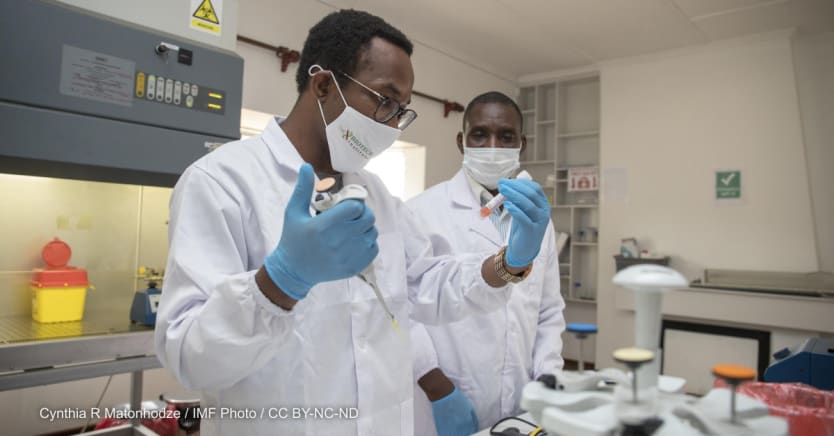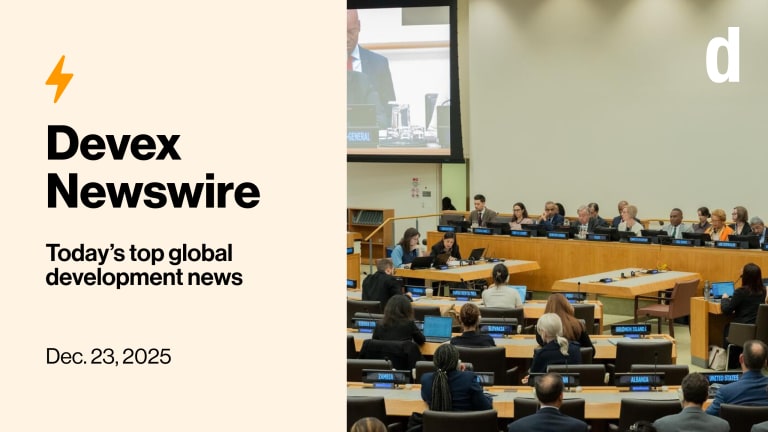
The working group tasked to look at the benefits of pursuing a new international agreement, convention, or instrument to strengthen the World Health Organization’s preparedness and response to emergencies has published its report. Some experts and observers welcomed it, while others said it lacked clarity and excluded references to other key instruments.
In the report, the working group recommends that countries at the upcoming special session of the World Health Assembly “establish an inter-governmental negotiating body in charge of developing a WHO convention, agreement or other international instrument on pandemic preparedness and response.”
It also recommends that countries outline a member state-led process to identify and develop the “substantive elements” as well as a zero draft of a new instrument, the mode of negotiation for it, and timelines. Additionally, the working group asks member states for support in continuing its work, to further develop proposals to strengthen the International Health Regulations, including potential “targeted” amendments to it.
Sign up for Devex CheckUp
The must-read weekly newsletter for exclusive global health news and insider insights.
IHR is an existing legal instrument that governs the way WHO and countries function during health emergencies. But during the COVID-19 pandemic, some countries and experts have pointed to its weaknesses and called for reforms.
This report will be discussed at the special session of the World Health Assembly, which runs for three days starting on Nov. 29.
Treaty or not
The lack of clarity on what the intergovernmental negotiating body will actually be working on however has created varying perspectives on the direction countries will be taking. Some experts believe countries will work on a binding pandemic treaty, but others argued that’s not yet entirely clear.
“It is not yet clear whether the mandate [of the intergovernmental negotiating body] will be to negotiate a treaty or leave the legal status of the final instrument open. The USA is insisting on open language, i.e. to postpone the choice of the form of instrument,” Gian Luca Burci, WHO’s former legal counsel and adjunct professor at the Graduate Institute of International and Development Studies in Geneva, told Devex in an email.
The United States is “not in favour of a treaty for internal reasons and don't want to lock themselves in to negotiating a treaty and only a treaty," he said.
The U.S. declined to comment as discussions and negotiations are ongoing.
Apart from the U.S., other countries such as China and Russia are also “not on board,” according to Lawrence Gostin, professor at Georgetown University and founding O'Neill chair in global health law.
“The major reason that some states are holding out is that they want to protect their national sovereignty and do not want to sign onto binding commitments. Others want more modest reforms such as amendments to the International Health Regulations, a political resolution, or a form of ‘soft’ law like a WHA resolution,” he said.
More questions
Some are unsure if pursuing a new legal instrument would deliver better outcomes for future pandemic preparedness and response than the existing IHR — which is also a subject of debate.
The report shows there’s a consensus of not reopening the entire IHR, and that it should be strengthened. But the way forward is still uncertain. Burci said some countries, particularly the U.S., are in favor of targeted amendments, but others are for avoiding renegotiating the text and finding other means to strengthen IHR instead.
There is a draft decision that, as of last week, focuses the work of an intergovernmental negotiating body on a new instrument, but leaves out work on strengthening IHR to the current working group on pandemic preparedness and response.
“It would have been much more logical to merge the two processes under the same roof,” Burci said.
Gostin pointed out that there are other key treaties to navigate, such as the Nagoya Protocol, and instruments such as the PIP Framework, but these are absent from the report.
“It is important because the cooperative sharing of virus samples and the equitable distribution of vaccines and therapeutics are core ideas for the future,” he said.
“The PIP Framework does that for novel influenza but not for other viruses including coronaviruses,” he said, adding that while not a treaty, it has binding commitments that are enforced through contracts with WHO.
A battle for access
Some access advocates see a pandemic treaty as another way to push for access to medical products and other countermeasures.
A treaty would not be limited to COVID-19, whereas the TRIPS waiver long fought at the WTO would only be for COVID-19 and be temporary if adopted.
A waiver would be effective if it includes an unconditional waiver on particular provisions of the TRIPS agreement, such as Article 39 that provides protection for trade secrets and know-how, according to an access advocate who spoke on condition of anonymity. The waiver should also not be limited to vaccines, the advocate said, but added that “I don’t see the WTO adopting the waiver as crafted by the proponents. The EU and others will weaken it.”
Similarly, a pandemic treaty would be effective depending on its contents, although so far WHO’s working group recommendations are a “good step forward,” with a text on equity not limited to vaccines, the advocate said.
The issue however is that it’s not clear at the moment what type of instrument countries will likely pursue.
Jaume Vidal, senior policy adviser for Health Action International and who’s been advocating for a TRIPS waiver, said that “what we have now is a report that seems to be inclined to suggest some kind of legal instrument. But the problem is [this is] where all the facts stop and speculation/wishful thinking begins.”
He thinks the international community should address, as a “matter of urgency,” the TRIPS waiver before dealing with other global negotiations such as a treaty. The process for a treaty could take years, with no guarantee of success, and could only divert efforts and attention from other initiatives potentially more aligned with lower-income countries’ needs, he added.
He also doesn’t think the report by the working group on pandemic preparedness is strong enough on equity. But any discussions on a treaty or other forms of legal instrument need to be inclusive, which means including the voice of civil society and accommodating the concerns of lower-income countries, he said.









